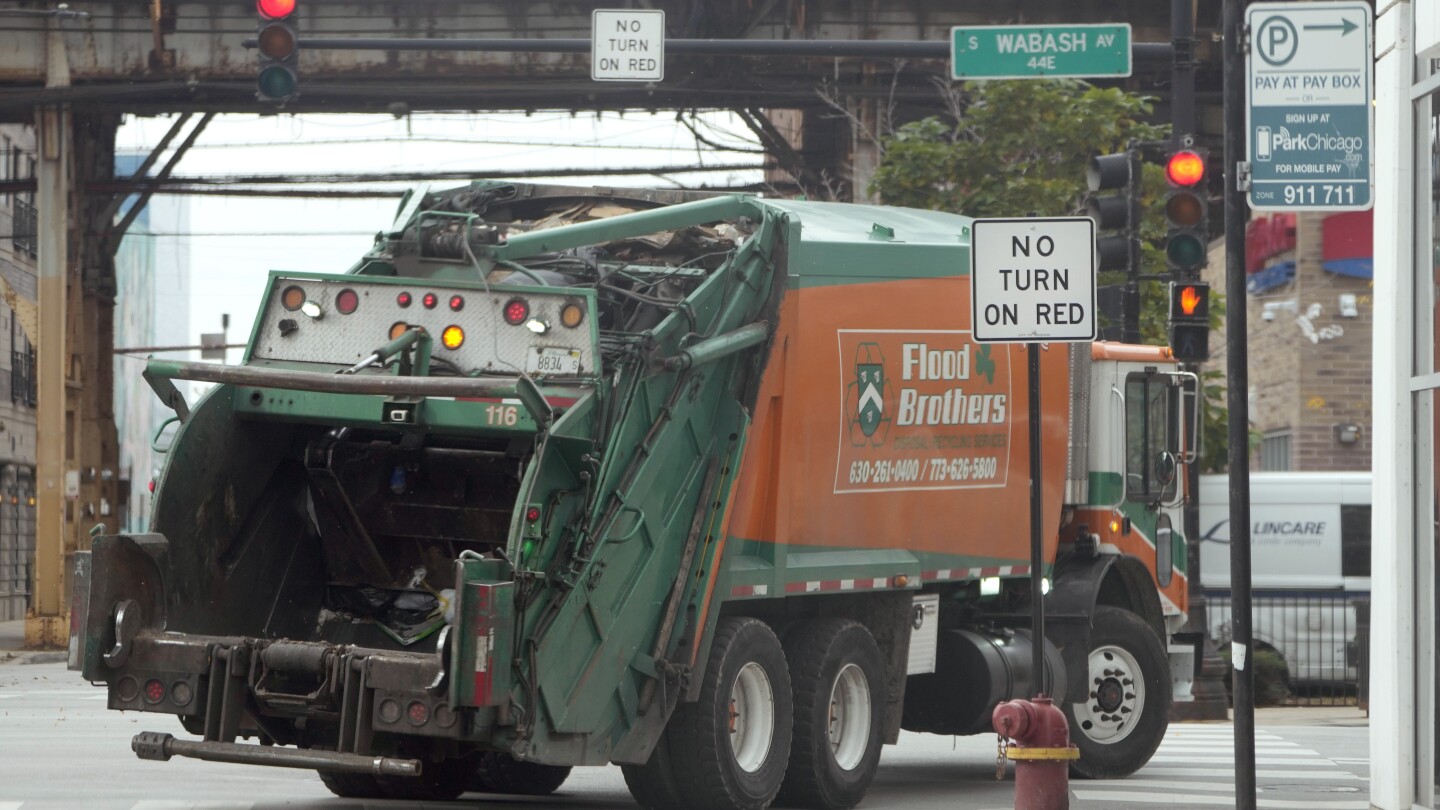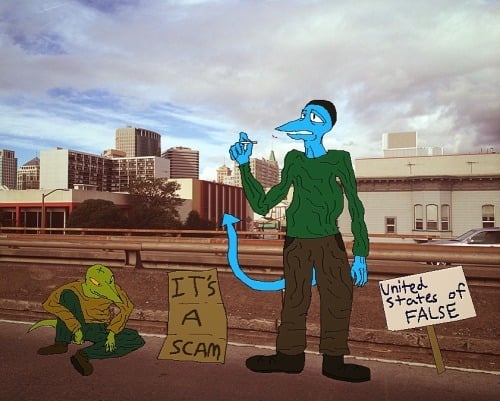Lights have to get smarter. Right on red is half the traffic flow in my area.* I always see so many situations where a green turn arrow would be appropriate, and yet the intersection is relying on the right-on-red rule instead, causing each car to pause when it should be flowing through. And even more situations where a light always stops the majority direction of traffic on what must be a fixed timer that poorly syncs with some upstream lights, because it always seems to turn red as a clump of cars arrives, even when there’s almost always no cross traffic. Maybe right on red is more dangerous in some places, and we can get rid of it, but we have to replace it with some actual civil engineering instead of making traffic even worse.
*±100% margin of error, sample size 1
How the hell did you get 0.5 cars going right on red? Did a car just plow through multiple houses between going straight and turning right at an intersection?
Your -2 comment score leads me to believe some people didn’t get your joke. I’ll explain it, which we all know will make it funnier.
The previous comment mentioned their observation of half of the traffic moving through right on red and, later in parentheses, said this was based on n=1, i.e., based on the observation of a single vehicle. I’m 100% certain that was a joke.
The follow-up comment was also certainly a joke. They’re pointing out that the commenter observed one car and then made the claim half of cars use right on red, so they’re jokingly asking how exactly half of one car made it through.
Get it? Now stop downvoting the dude, stats are great, stats dad jokes are better.
Its acting like both a wave and a particle
Yes, but with a ±100% margin of error, that means right on red traffic could be anywhere between 0 and 100%. I think it’s a safe assumption that with n=1 it’s one of those extremes, not fractional cars.
And today I learned that people should joke around more with statistics.
Totally agreed, and from the pedestrian side of things, civil engineering would be helpful too.
Our roads are too fucking wide for pedestrians. Give me some pedestrian islands and raised crosswalks.
I’m more interested in giving pedestrians a direct route that doesnt need to cross fast traffic.
fixed timer that poorly syncs with some upstream lights
This has gotta be the number one traffic issue in the US. Our timer lights are just garbage and we so rarely use sensor lights. Our traffic light setups always seem overcomplicated but not over engineered.
Pedestrian signals are slow too. Have to wait a long time to get the WALK signal, and its rarely necessary as it’s already illegal to not let a pedestrian go at a crosswalk if you’re turning into it, in my state.
Let me preface that I think using vehicles as a primary source of transportation inherently scales poorly, and you can easily argue this by looking at how much a road costs versus a rail and how much mass you need to move per person on car versus train.
That being said, I really hate this article because it relies on anecdotes from various people and opinions without making any effort at citing relevant statistics. It literally cites the TOTAL number of pedestrian deaths to vehicles in 2022. I tried to find some statistics on right turn on red light, but all I could find were 20 year old or older studies, most of which actually concluded that right turn on red doesn’t really account for a large number of pedestrian injuries and deaths. Like this one, for instance, which claims that right turning on green can also result in pedestrian accidents which could result in much more severe injuries (I can see how this might be true but there’s no evidence to back this up.)
It’s interesting for me to look at this from a utilitarian perspective: Surely there is a tradeoff between the amount of time wasted due to traffic increase due to right turn on red, and the time equivalent to the amount of lives lost due to RTOR (assuming RTOR results in more deaths). This of course is an incomplete/flawed way to look at things as we don’t give highway collision motorists the death penalty for causing huge traffic blocks; iirc though it is how a lot of safety studies are done (look into how the statistical value of a human life is determined from highway transport administrations).
I would really appreciate if someone could chime in with some actual stats and numbers (though I doubt they’re readily available) about the topic, rather than some anecdotal comments. I’m not a fan of symbolic legislation that doesn’t provide real benefit (think plastic straws bullshit), and I would like to see a convincing take on whether or not this is that.
I don’t have stats this is pure anecdotal. My experience in Seattle is that I’m overwhelmingly almost hit by cars when we’re both going the same direction and they’re turning right on green. Not just compared to right on red but all situations where they almost get me. I’d also love real stats on the matter though
Having the green light coincide with a walk signal is basically coaxing drivers to strike pedestrians. In crowded parts of a city with idiot drivers behind me, I’ve actually had people try to pass me on the right (and drive into pedestrians) after laying on their horns while I was making a right because I was properly waiting for pedestrians to clear the intersection first.
It’s bizarre that they set the traffic up this way. They should make a right arrow and have it red, or do pedestrian traffic while the red’s still on or something. But a green light with a walk signal is very stupid.
Most of the lights in my area do try and alleviate this some by having the pedestrian signal active for a little bit before the car signals go green. It only works though if you’re at the light when the pattern starts, if you get to the intersection in the middle of it than it is still a problem. Also some drivers see the pedestrian signal and use it as their own green light anyway so I still need to be really cautious.
Yeah lane passing is super common in Seattle when someone is trying to turn. They recently redid the entire setup of the intersection by my apartment because people kept zooming around and getting into collisions. I’d say I used to hear or watch a collision about twice a month.
Anecdotally, since COViD it seems like for right on red, people blast through at full speed without slowing. It ‘s certainly scary trying to cross a street even with a walk sign, but I haven’t died yet
I’m My State when the lights turn green to take a Right the pedestrian light also gives the pedestrians the green light to cross. So we have cars turning right while pedestrians are crossing. How much safer is that. At least now when you take it right on red the pedestrians don’t have the right to cross.
Yeah you’re supposed to yield to pedestrians yet there are no signs indicating so, it’s so dangerous
Equally safe as if a vehicle was coming from your right. You are suppose to yield to those participants in traffic. It’s just that pedestrian can’t hurt you so they are commonly ignored. But they have equal rights and laws like every other participant.
Changing traffic laws will have some effect, but really we should be working on more lightrail and more high-speed trainsets. It will take time for housing and business to rebuild around stations, but it will simultaneously keep people safer, alleviate traffic, and reduce emissions. Nothing more satisfying than flying by traffic for less than the price a gallon of gas, especially if you live a decent distance from work or school too.
USA has ass-backwards system for getting drivers license. At least from I could find online. You get learners permit after passing written exam. That’s not nearly enough. In my country you have to attend 20 hours (optional depending on existing licenses) of theory, then pass theoretical exam. Then you have a driving instructor assigned to you for total 40h (or 20h depending on existing licenses) in 1h sessions. You first start training court where you train to start, stop, turn and other driving maneuvers. When instructor deems you ready for traffic only then you get to drive with them in the car and having dual controls for the vehicle. Only when instructor deems you ready you are allowed to take the test for getting the license. And even on the test you first have to pass training court before you are allowed to enter traffic.
By the time you got learners permit you have at least 40h of driving in traffic which is significantly better than just passing written exam.
In my eyes, law is not the problem but experience and people paying attention. Phones, doing makeup, eating food and other things should be forbidden in car because it distracts you too much.
The US is too car-dependent to make a drivers license harder or more expensive to get. Less safety is the price we pay.
Your roads are wider as well, which someone thought was a great idea for lowering number of traffic accidents, but in reality it only makes people drive faster and more reckless.
Yep, and we are generally not willing (as a society) to pay decent wages for things like teachers, so getting drivers ed teachers for all student drivers would be not possible. Private lessons would work but that would make it unavailable to a lot of less affluent people.
If someone is too stupid to learn to drive safely maybe we don’t need them participating in society anyway.
They are free to participate in society, just not drive on the roads. It’s their fault if they can’t learn how to drive.
We need to hold people to some standard. If they are incapable of learning how to drive, we should direct resources to those who are. It’s time we stop catering to the lowest common denominators of society
When I was taking the test prior to my appointment was a girl who failed, and I kid you not, 8-9 times already. She was shaking out of fear. We had a common instructor so I overheard him tell her where she commonly makes mistakes. Basically her driving is fine but she doesn’t follow signs one bit. She would drive fast in school zone or blow through stop signs. And I completely agree, some standards must be upheld. Just being able to get the vehicle moving is not a reason enough to own a license. You need to be able to be part of the system.
You pay much MUCH more for your car dependency, you just don’t even realize how bad it is
There are at least 50 different systems for getting a driver’s license in the US since each state issues its own license. Some states are far more rigorous than others. My home state has a system similar to what you describe only it includes an additional 40 hours driving with another licensed adult, in addition to the hours spent driving with a certified instructor and the classroom hours.
The state I live in now? Not so much. They basically just give out licenses to anyone who shows up, pays the fee and can show that they know what the different pedals do. Unfortunately this produces terrible drivers, as you would expect.
I just did a causal search and got that info but I fully expected a difference between states. Not to such a huge degree. Professional instructors can never be replaced by adult who has a license, no matter how many hours of experience they have. Instructors deal with beginners every day and are familiar with most common mistakes. They also have to be certified here and retake that certification on regular basis.
Saddest thing of all is that safety is lowest common denominator. You can be a good driver and even have tons of experience, all it takes to get hurt or killed is one poor driver. If your own safety in traffic depended on your own skill and you couldn’t hurt anyone else, then by all means take as poor exam as you want but that’s not the case.
It all depends upon state. I think the learners permit requires another licensed, adult driver to be in the vehicle and has other restrictions.
That said, I’m with you. I originally learned to drive in rural Ohio. I moved to Japan and finally decided to get my license. Since my Ohio license expired, I had to start from zero. I spent two weeks knocking it out at a training camp (there’s a restriction on the number of hours of practical training per day, so there was a fair amount of free time). First, had to pass some basic checks. They did start practical on the first or second day on their closed course. There’s a mid-point test that one must pass before being able to go out on the roads. There’s a number of hours more of this and then two final tests (course and driving).
I got my mid-sized motorcycle license this year and that was also a number of hours (I want to say 17 altogether since I had a regular car license), though exclusively on the closed course.
In my opinion, licensed adult is not the same as professional instructor. I also got my motorcycle license last year and the amount of knowledge and skill my instructor taught me was huge. It shouldn’t be a surprise since professionals will always be better at their profession than regulars but still it came as surprise.
In my opinion, licensed adult is not the same as professional instructor
Oh, definitely. I just added that in case anyone reading thought it meant they could just start driving on their own or something.
Ah, okay.
Right on red also causes terrible traffic problems at busy intersections as people who don’t have the right of way turn right while people who do have right of way get stuck waiting to turn left or are forced to block the intersection.
I wish my city would get rid of it, at least in downtown areas where traffic is a problem and a lot of pedestrians are walking around.
Those people are driving improperly. You’re supposed to only proceed through the intersection if it’s clear, both of oncoming traffic and of traffic that might cause you to block the intersection.
Yes, but that’s how people operate in reality.
I think the point is that trying to ban right on red will change nothing because they will still just drive incorrectly turning right even if they shouldn’t they already weren’t supposed to be turning
Most people adhere to “no turn on red” signs.
Maybe in some places but definitely not in seattle. I see people turn red at intersections very clearly marked no turn on red all the time
I live in Seattle. That’s what I’m referring to. Most people do adhere to it, but it’s not that uncommon for people to violate it.
The ban is mostly followed in NYC, at least in Manhattan where I lived for 6 years.
Self-centered assholes, will always be assholes. Removing a law won’t help with that. Those are the same people who thing it’s okay to drive through lane for turning right and then cut in a long line to keep going straight. Even if there was a green light law states that you should enter intersection only if there’s enough space and time to clear it. Exactly for that reason of preventing blockages.
In general, urban signal-controlled intersections are just the traffic engineers screaming “I’ve tried nothing and am all out of ideas.”
We use them pretty much by default in the US, but most urban areas should be vastly cutting back on them. All-way stops and, of course, roundabouts are both provably FAR safer often with no impact or a positive impact to overall congestion. Plus, pretty universally much cheaper to build and maintain.
Signal-controlled designs should be reserved for intersections where it is literally not possible to fit a more passive design while maintaining sight distances or for places where truly huge traffic volumes are involved (a significant interchange) where no other traffic flow redesign is possible.
Using traffic lights is ALL about increasing level of service. Which is just code for “The city values keeping more cars moving faster over both safety and financial responsibility.”
All that to say, I bet a lot of the intersections that would be most annoying without right on red… don’t really need to have lights controlling traffic flow in them at all.
Aren’t roundabouts typically significantly larger than an equivalent intersection with traffic lights? If so I’m not sure that’s what we need in urban areas. We already give up so much public space to automobiles. There’s also the question of where does that additional space even come from? Do we bulldoze more homes? To me it seems real solution is to move away from personal vehicles in urban areas. Anything else is just trying to justify an inefficient and unsustainable lifestyle.
They tend to be significantly larger in new construction because small ones don’t really cost a lot less than big ones and most designs prefer to do something nice with the landscaping. Plus, bigger ones flow better. But you can retrofit ones that aren’t vastly larger in size.
All of this is equally true of a road with bike lanes vs one without them… yet cities always seem to be able to find the space, typically by dieting the road a bit. There’s typically lots of options. Narrow lanes, reduce lanes, eliminate some/all on-street parking, cannibalize the median, etc…
Neighborhood traffic circles are a pretty easy drop-in replacement for most of the worst-offender small intersections, too, and they can be achieved with as little as painted lines.
" All-way stops and, of course, roundabouts are both provably FAR safer often with no impact or a positive impact to overall congestion." This is a pretty big statement to make, and I was wondering if you could provide me the sources for this.
“The city values keeping more cars moving faster over both safety and financial responsibility.”
But isn’t keeping cars moving faster financially beneficial? From an energy perspective, needing to stop for every stop sign is way worse on fuel economy than going through a string of green lights and stopping every now and then. Don’t get me wrong, I think using cars as a main mode of transport is incredibly stupid, but I think there must be some tradeoff between time/money/resources wasted due to traffic and time/money/resources lost due to premature deaths or poor living quality due to (non)fatal accidents.These climate-based arguments for why we should maintain cities primarily designed around the car are just… dumb. Don’t fall victim to them. There is only one effective way to reduce congestion long-term and that is reducing the need for cars. Creating streets that are safe and pleasant for people outside of cars promotes alternatives to driving. And in doing all of this, you’ll have a huge impact on the climate instead of a worthless marginal one.
Road user cost is an EXTREMELY well-studied field with hundreds of complete manuals and textbooks written on the subject. Most states have their own full guidelines. You can very, very directly quantify what the impact of things like work zones is in terms of dollar figures based on theoretical impacts to travelers. So yeah, in those terms, the DOT does put a dollar value on congestion, absolutely. Just as the EPA creates a metric for putting a dollar value on a human life when analyzing impacts of pollution.
The actual traffic study for this would be comparing an intersection with ROR AB tested to without ROR, modeling the increased delay for drivers, and translating that into a figure. A minute or two delay… actually doesn’t amount to very much, and that’s what a typical case would be of forcing a driver to wait an additional cycle. Not to mention that, in a world without ROR, there is no a very good reason to force engineers to do their fucking jobs and design the intersection to work better without that dangerous crutch.
The Philadelphia paper is the seminal work on all way stops being safer than signals in urban contexts. It is pretty definitive and similar studies have confirmed the results, cementing them into most complete streets design guides.
Studies on roundabouts being safer are… even more conclusive and abundant. I really can’t cite just one because damn, there’s so damn many.
“Creating streets that are safe and pleasant for people outside of cars promotes alternatives to driving.” I don’t disagree with this, but the problem is that in the US there often aren’t any alternatives to cars to get around. And to be frank, I’m not gonna be walking around on the streets of LA (where I live, insert your crime-ridden US metropolitan here) unless I have good reason to. Getting hit by a car due to RTOR is the least of my worries as a pedestrian. I think a lot of change is necessary (such as locations of stores, etc) beyond safe streets to reduce the need for cars. For instance, if costs of living in the city were better, people wouldn’t need to use cars to commute. Maybe it’s a starting point to fixing our transportation issue but honestly I don’t see it.
“A minute or two delay… actually doesn’t amount to very much, and that’s what a typical case would be of forcing a driver to wait an additional cycle.” You say this, and it might be the case the vast majority of the time, especially if the stoplights are separated by a large distance and there aren’t many cars, but traffic is a distributed problem and without seeing some sort of study that indicates this I don’t buy into it. During heavy traffic, if the cars from one intersection back up into a previous intersection due to reduced throughput I can’t imagine how an additional cycle is the only cost. Maybe this is just dependent on the traffic situation, because I have a natural bias to think towards traffic situations in LA (which don’t necessarily represent the rest of the US).
“The Philadelphia paper is the seminal work on all way stops being safer than signals in urban contexts.” Can you tell me who the authors of this paper are or maybe offer me a link? I would like to read it, thank you.
“Studies on roundabouts being safer are… even more conclusive and abundant. I really can’t cite just one because damn, there’s so damn many.”
Yeah so I’m pretty sure roundabouts are better in every way except for space. But if only getting more space would be easier, because surely we could just replace a lot of our roads with trains at that point right? I think roundabouts are a red herring because they literally don’t fit in most of these intersections (they don’t even have space for a left turn lane in many of the intersections I drive in). Heck, if we’re talking about space-throughput tradeoffs we could just theoretically make every single intersection a graded interchange and that would provide a huge amount of throughput (but this too is a red herring).This is the Philly paper. You can explore through its cited bys and references if you want to see the continuing state of the research, but it’s pretty rock-solid. There’s very little doubt in the minds of any policy experts I know of or have read that signaled intersections, in urban contexts, should be used far less. That all-way stops are almost universally a safer design.
Your response on my points about delay is very much just one small problem thinking. I admit, LA’s traffic situation is utterly fucked (thanks to putting the car at the center of all their urban planning for decades, which results in cities that are somehow undriveable AND impossible to navigate outside of cars at the same time). As a person who is immersed in this (and currently published in the TRB, if you can take my word on it because I won’t be doxxing myself), let me assure you: traffic engineers are lazy, unimaginative fuckers. They follow their design manuals like bibles. ROR is easy to execute so they execute it rather than spending the extra 30-40 minutes to include more comprehensive phasing in their proposals. The manuals tell them that’s all they have to and most others are too scared to challenge their “expertise”.
Any traffic system that is going to gridlock because of removal of ROR was misdesigned. Period. Also was probably going to do it anyway, especially as traffic naturally grows over time (outside of the effective policy projects to reduce traffic, e.g., complete streets/multi-modal transportation plans).
If it is low enough volume that it makes sense to have ROR, it shouldn’t have the signal at all.
If it is high enough volume that it risks serious problems if ROR is removed, the ROR almost certainly unsafe to begin with and a dedicated turn signal should be incorporated. Even if it just a signal indicating when it is acceptable to make an unprotected right on red.
ROR is currently the default and “opt-out” in relevant US intersections. It should, at best, be an opt in (e.g., with an arrow indicating you can turn right while yielding during certain phases).
I am not saying all traffic lights should go, but we have far, far, far too many of them. ESPECIALLY in the US, where they basically always have extremely simplistic phasing that, outside of peak rush hour times, simply increases average trip times.
To put it another another way: Braess’s paradox hints at a larger truth: the systems that intuitively seem helpful to prevent congestion are often what CAUSED the congestion. There’s no strong research on AB testing for congestion vs traffic signal removal that I am aware of, unfortunately, because the study is just laden with confounders eliminating any real AB comparison (e.g., making streets safer for multimodal traffic, e.g., by removing signals and replacing with all-way stops, leads to fewer people driving and that may be the “real” reason congestion goes down).
Don’t miss the forest for the trees. Removing right on red is a safety win anywhere you do it. The congestion effects, if and when they even exist, can be addressed through separate system adjustments.
RE: crime… nothing is a better crime deterrent than humans present. My prescription is still to make the streets and neighborhoods more walkable. Adjust policies and designs to get more people comfortable being out there. Not even going to get into challenging the idea that crime is truly on the rise – we both know that it isn’t really.
Roundabouts are pretty cool n and I definitely agree we should use those more (my experience with them is great when people aren’t total morons) but you’re insane if you think 4 way stops don’t affect traffic. Where I live they’ve put in lights now multiple times at intersections like that and it immediately makes traffic better.
my experience with them is great when people aren’t total morons
It really doesn’t matter. They’re safer and better even if – maybe ESPECIALLY if – total morons are going through them. They just change the geometry of how an incident could even happen and leave everyone safer.
Why not enforce the “pedestrians have the right of way” thing?
The point is that people driving don’t expect to see them, thus have trouble seeing them.
We’ve had right on red for a long time, maybe the cars (trucks) you can’t see out of are the problem.
Sounds like Revenue Generation to me. Some out of town driver doesn’t know about the local traffic law, gets cited for breaking it, and loses if they fight it.
If it makes it safer while generating revenue, it sounds good to me.
The revenue comes from people though. People who may or may not have the funds to pay it. It’s sneaky and mean
And fewer people could get hurt.
Edit: I don’t really care that much if some get fines, if it reduces deaths. And someone obviously has to start banning it first. Maybe it works wonderfully and everyone else starts banning it.
If it doesn’t help then then they should remove the ban.
Drivers are becoming hostile and idiotic by the day. What you’ll also notice is when it is green, they will stop instead.
Need higher or more severe penalties if this is to save lives
Green doesn’t mean go, it means you are allowed to go. Law specifically states that you are to enter an intersection only if there’s room for you. That is to say you can clear it and not clog the traffic. So no matter if it’s green if there’s congestion in the intersection you are not suppose to enter because that exacerbates the problem.
Personally, i think every infraction on the road should require your Drivers license gets revoked until you go to the dmv & retake your drivers test.
Speed? Blow a stop sigh? Illegally park? All of it should require a retest in order to regain your driving privileges…
In Utah people are allowed to turn right on red lights. But what most people don’t seem to understand is, that means AFTER you’ve come to a stop at the intersection, and made sure it’s SAFE to turn right. I’ve seen so many accidents here because people think if they’re turning right, they don’t have stop at the light - even though there’s traffic coming through the green light side of the intersection. The problem isn’t the law, it’s that people don’t pay attention and think about what they’re doing. In every accident I’ve seen, humans not paying attention is the real cause.
You’re missing the point. At a right turn, traffic is coming from the left and pedestrians are coming from the right. You focus left to make sure traffic is clear and then go, meanwhile a pedestrian has entered the intersection from the right and you don’t notice them.
You stop. Look left. Then look where you’re going then go. If you look left and drive without looking right, you’re fucking up.
I can conservatively say that 99% of the time I approach an intersection, I see all potential pedestrian crossers long before I’ve come to a stop, including those on the other side of the street planning to cross towards me. Pedestrians rarely appear out of nowhere, so looking left but not looking right is a poor excuse.
99% of the time I approach an intersection, I see all potential pedestrian crossers
If you make 50 car trips a month and encounter four intersections, then you don’t see two pedestrians a month. That’s probably pretty accurate. Most of the time, most drivers and most pedestrians are aware, and behave safely.
Pedestrians and drivers die during that 1%.
Only applies if there aren’t bicyclists and if your view isn’t blocked. I’m sorry but your attitude is why pedestrians are dying.
are bicyclists on the road? you should be able to see them same as a car
poor visibility of sight lanes is a different issue all together and should result on a no right turn on red sign, I have one I drive through daily due to a hill on the left
real cause is larger trucks and suvs mean most people can’t see the road in front of them
Where I live we have a lot of separated bike lanes where most cities have sidewalks. So yes there are bikes on what you incorrectly identified as a sidewalk .
I’ve seen those before, not a fan given how poorly they are marked
In many locations bicyclists ride on the sidewalk, especially in high traffic situations in the USA where right turn on red is going to be deadly.
real cause is…
Yes that is one issue, but sightlines are a major one and a significant factor in why Hoboken has almost entirely eliminated pedestrian deaths while the rest of the nation continues to see them rise. Hoboken didn’t get rid of larger cars.
What people “should” do and what people actually do are two very separate concepts. Most days I ride a large motorcycle with giant panniers on it, covered by reflective shit and wearing high-viz clothing. Drivers look right at me and still don’t see me, because their stupid little brains are not trained to process anything smaller than an oncoming SUV.
All competent bikers ride on the road. Children and elderly and beginners ride on the sidewalk. The sidewalk is actually more dangerous because of driveways. I never see cars check before zooming straight into the street. I had commuted by bike for nearly 20 years, been hit by cars 4 times and nearly wiped out countless other times. I don’t understand why cars have more rights than pedestrians and bicyclists on the road. Whatever protects pedestrians more should be automatically applied.
Cyclists should not be coming from the right (unless it’s a two-way bike lane on one sided but I’ve only ever seen those on a one-way).
All I hear in your excuses is, “I don’t pay attention to my surroundings until I arrive at a crossing”. Sorry but I think you’re the danger on the road based on this.
The person I responded to literally claimed that they’re infallible and see every person approaching no matter the intersection. If that isn’t the exact definition of what you are saying I’m doing then I don’t know what is. You are clearly the danger if you think that anyone can pay attention to everything happening at all times. There’s a reason that more people die on roads in America than they do in Europe and it sure as hell isn’t because those drivers are somehow better than American drivers, it’s because vigilance doesn’t matter. Road design does.
Me. The person you responded to was me. And I didn’t “literally say I was infallible”, i truly think you’re a moron now, and I hope you pay more attention to the road than you do to this conversation.
And at green lights, you don’t even stop to look for pedestrians. You look while in motion. I’d figure that would actually be the less safe situation. Are there studies either way?
You think pedestrians are hiding in bushes waiting to jump out?
In a densely populated city with lots of foot traffic? Sure, ban right on red, too many cars in cities to begin with.
But lots of cities have spent decades expanding and there’s hardly anyone walking once you’re a couple miles from downtown except for certain areas. Same for small towns.
Making it all legal one way or the other in a state just makes zero sense.
What’s wrong with just putting up a sign by the light if it’s not allowed?
The problem is it isn’t zero pedestrians, it is slightly more than zero so driversquit looking as it seems there never are any and then the exception happens and they didn’t look.
I can confirm that approximately 0% of drivers stop before turning right on red in my location in the Northeast, as well. I have actually had other drivers chase me through traffic to catch up with me at the next light and get out of their vehicles to threaten me because they were so angry that I stopped before turning on red, like you are legally required to do. It’s absolutely insane.
People treat a right turn on red like it’s their own personal green light and everyone else just has to get out of their way. They don’t look to see what’s coming and most of the time they don’t even slow down first.
There are intersections where if you’re familiar with them you know what is safe. For example at one intersection near me if I just miss the green I know the next signal is to give cross traffic left turn greens, which means no one else can be going into the lanes. I do stop, but only for a brief moment because there can always be inattentive drivers doing the wrong thing.
Of course I’m not one to really get pissed at folks for not conforming to my driving preferences, so that part is weird to me, but I do get annoyed when someone stops for like 20 seconds with no traffic. If you do that, you might get the shortest toot with my horn I can manage to wake you up if you’ve somehow forgotten you can turn, but that’s it.
I don’t go anywhere with so tight a time margin that an extra minute or two in traffic is going to matter.
Well that annoys me too, especially when someone has both a green light and green turn arrow - and they don’t go, they just sit there. I’m like - what more do you need, an engraved invitiation to go ahead and turn?? Then of course the light changes and we’re all stuck waiting for the next signal.
I’m a very cautious driver, I’ve learned to be defensive in my driving and always keep my eyes peeled. So I do think it’s better to err on the side of caution. I try to take into account that someone might be older or having eye problems or needs a few more seconds to complete a turn.
I live in Utah - which is bad enough, but I deal with this punitive driving malarky all the time. People getting angry at me for stopping at a red light before continuing into the turn - as if I’m the one doing something wrong!! And just where are all these people in such a frantic, panicked rush to get to that having to courteously wait for someone to turn is going to ruin their entire g-d day.
You talk about people always thinking they have a personal green light. Here in Utah, NOBODY yields right of way to anyone. In fact, every day we have more people getting hit by our Trax commuter trains because they refuse to stop for the flashing red signals and wait.
And don’t think for a minute anyone here will yield right of way even if you’re the one who actually has it. They never look to see if someone is coming in front or behind them - they are so oblivious to everyone else and just expect people to jump out of their way. It’s really sad to see this anti-intellectual, anti-humanitarian trend in dangerous driving.
If i get a dollar every time I’ve been honked at for stopping on a red I can live a much comfier life
Someone honks I’m going too slow? Guess we’re sitting here until a green light. Turning right on red is a choice.
We don’t have right on red in europe. Can’t imagine crossing the road to a median with it
We do have conditional turning lights though.
Right on red for us would be like left on red for you
Remember, our roads are flipped
Europe drives on the right. In that part of the world it’s really just the UK and Ireland that drive on the left.
https://en.m.wikipedia.org/wiki/Left-_and_right-hand_traffic
That may be generally true, but the person they were replying to seems to be from the UK or Ireland.
Bruh what in the hells did i even do to deserve getting fucking insulted like that
Ah shit but of course
It’s banned in NYC but not enforced, so it may as well be legal. Then again, barreling through a red light also isn’t enforced.
NYC has traffic laws? I thought the only rule was to survive
No you’re basically right. Our cops only care about catching subway toll jumpers
That’s about half of it. They also have all the time in the world to harass motorcycle riders.
deleted by creator
They should ban slip lanes too
I was in the US a bit over a month ago. Started to cross when the walk signal became green. A driver went into the crosswalk we were stepping into, only looking left and never coming to a stop until she saw the guy crossing from the other side. She never saw us once and nearly ran us over. We don’t have the equivalent here (left on red) in Japan and we do fine. Get rid of it.
It often results in dangerous situations. It also keeps bicycling from becoming commonplace. Way too dangerous to bike in most areas.
Drivers should not have the option to decide for themselves when they think it’s safe
I hate this sentiment. They don’t want people to think for themselves.
Think they mean that most people don’t have the necessary knowledge to determine whether a specific action or inaction is safe. Which is absolutely true.
I disagree. More often than not, people make the safe decision.
I don’t think we live on the same planet.
And yet, less than 50% of car trips result in crashes. Ergo, people make the safe decisions more often than not.
I don’t think that’s true at all and if it was we would have a way bigger problem to solve
















